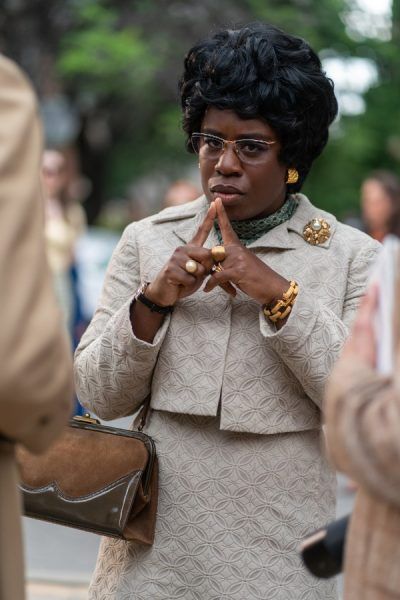Mrs. America is not a story with a happy ending.
To be clear, the era of history being chronicled by the new FX miniseries is one that witnessed substantial change for the way in which women weren't just treated, but regarded in American society. To quote an advertising campaign created to profit off the women's movement, "We've come a long way, baby."
However, while the civil rights strides that have been made over the decades represent significant progress, any narrative talking about the Equal Rights Amendment is going to feel like a tragedy. For years, women (and some men) campaigned tirelessly for the idea of putting language into the United States Constitution that guaranteed true equal rights for all. And it didn't happen within the deadline.
This casts a harsh shadow over what is otherwise a captivating, well-made portrait of an important American movement that features one of the best ensemble casts in recent memory. While in so many ways, this is really Cate Blanchett's show, and to be clear she's as stunning as you would expect, Rose Byrne, Sarah Paulson, Elizabeth Banks, Melanie Lynskey, John Slattery, James Marsden, Roberta Colindrez, and more represent a staggering achievement of casting. When Bobby Cannavale shows up for a small role in episode five, the infamous refrain of John Hammond came to mind: "Spared no expense."
Uzo Aduba is such a strong actress that it's a thrill to see her tear into a role like one-time Presidential candidate Shirley Chisholm, bringing out all the nuances of frustration that come with playing a woman who deserved far more respect and consideration from her peers in her time. While Byrne is buried beneath massive wigs and arguably bigger glasses as Gloria Steinem, she still makes the feminist icon personable. But it's Tracey Ullman, whose sketch comedy history has proven her capacity for being a chameleon, who might be the true scene-stealer of the series: Her take on Betty Friedan is flawed, funny, messy, and fierce, escaping canonization to find the woman within.
Again, this is an mind-blowing cast — let's take a moment here to acknowledge the brilliance of Character Actress Margo Martindale, playing Bella Abzug while wearing an outstanding collection of hats. But it really boils down to Blanchett as Phyllis Schlafly, which is understandable given what a fascinating character she is, with all her complications, ambitions and vulnerabilities. While never shying away from Schlafly's most unpleasant qualities, including her willingness to align with unsavory political allies (like the Ku Klux Klan), Blanchett finds a lot of humanity in a figure who was largely reviled by her generation.
While creator Dahvi Waller, on the surface, could be accused of taking a "very fine people on both sides" approach to the topic, that only extends to putting significant effort into really trying to understand women opposing the ERA. Paulson, playing a composite character who supports the anti-ERA movement, exists largely to humanize this idea beyond Schlafly's ambitions, while Jeanne Tripplehorn, playing Schlafly's single and childless sister-in-law, is there to showcase how much of a woman's life was tied to her family life — and how hard it could be, if you fell outside the traditional lines.
Meanwhile, there is effort put in here to recognize how the women's movement did a less-than-great job of including the needs of all women, specifically women of color and queer women. However, the show's blunt focus on the players it chooses means that women of color and queer women are still left on the sidelines. The big exception to this is Aduba as Chisholm, but even her story, beyond some additional scattered appearances, is largely limited to one episode. (And "her" episode, to be clear, begins and ends with scenes featuring Schlafly.)
For the record, the main titles sequence is an easy contender for an Emmy nomination (whenever the Emmys return), with the blunt way it captures the era and the conflict with its bold graphics. And production-wise, every detail feels cared for; producing directors Anna Boden and Ryan Fleck present every element with the authenticity deserved (especially the hair and make-up design).
It's still a series that struggles with the question of its need to exist. When I recently mentioned to my parents that I was reviewing this series, they asked me, quite seriously, if this was one they were going to watch — because after all, they had been around during this era, and they didn't necessarily feel the need to relive it. My answer to them was that it felt important, how well the nuances of the fight for equal rights were documented, and also, frankly, how good the cast was. But if they don't end up watching it, I honestly can't blame them.
Because here is the fact of the matter: The document that serves as the foundation of our country does not, at this time, contain language affirming that women are equal to men. You can take the Ainsley Hayes approach and believe that the 14th Amendment, added to the Constitution in 1868 after the abolition of slavery, is enough protection for women's rights. (It does, to be fair, refer to "all persons born or naturalized in the United States," unlike other sections which use the word "men.") But, my fellow American women, thing is — despite decades of fighting, we still don’t have real, confirmed, equal protection under the law.
Which means we need to keep fighting. But Mrs. America doesn't end up inspiring the desire to fight. Instead, it makes it seem that the fight for real equal rights is perhaps impossible, an affirmation of what so many of us already feel, deep down inside.
The stories being told here matter. They're important. But the reason for telling them, the purpose driving this series, is unclear. Despite its setbacks, the women's rights movement has done so much for women in this country. More victories could still happen in the future — pushback against abortion restrictions, true equal pay legislation. But recounting the movement's failures won't necessarily make women more free.
Rating: ★★★★ Very good




